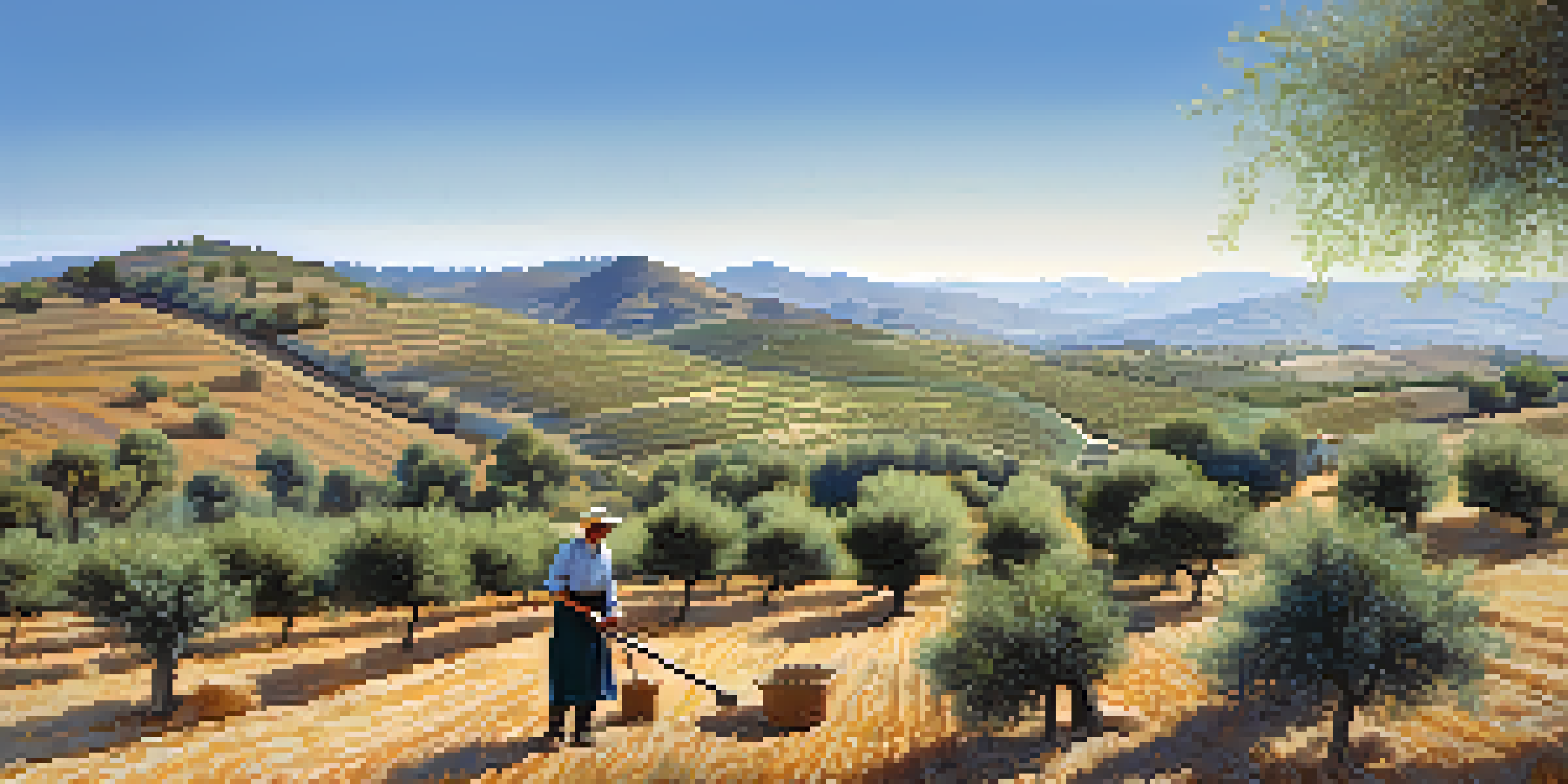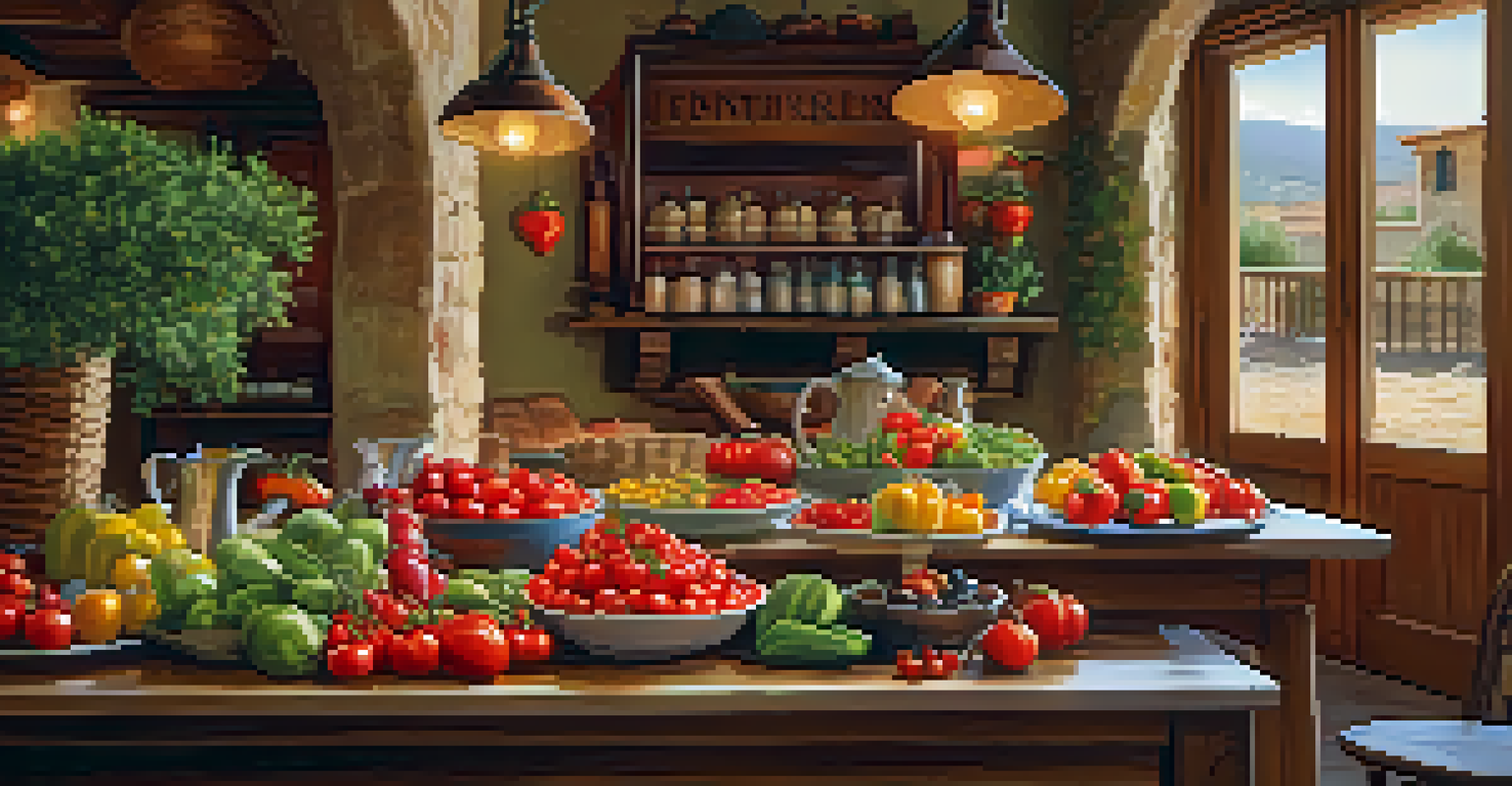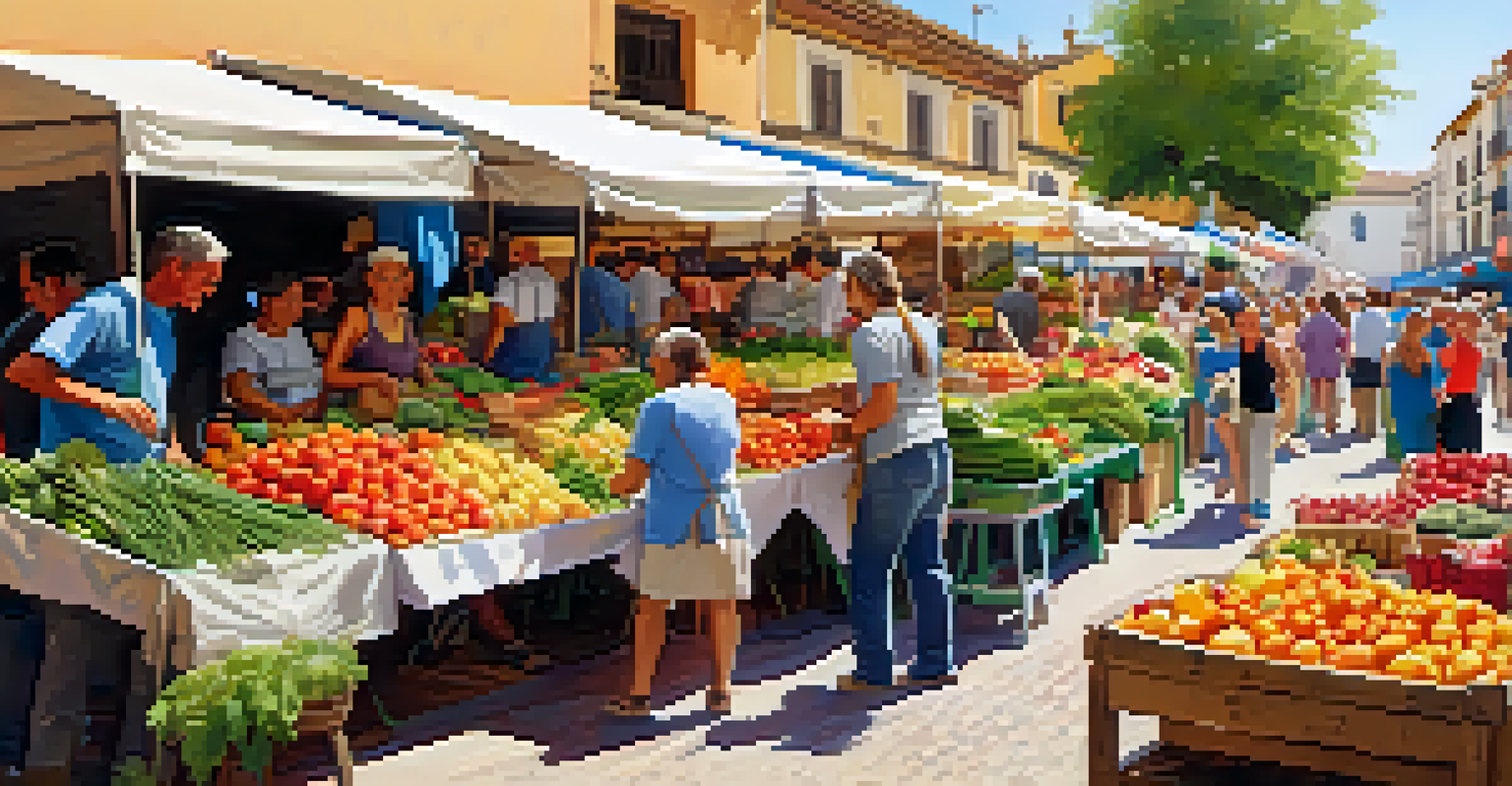From Farm to Table: Spain's Sustainable Culinary Practices

Understanding Spain's Rich Agricultural Heritage
Spain boasts a diverse agricultural landscape, with regions producing everything from olives to seafood. This rich heritage is deeply intertwined with the country’s culinary identity, reflecting the flavors and traditions of its various regions. Understanding this agricultural diversity is key to appreciating how sustainable practices are rooted in local culture.
Eating is an agricultural act.
Many Spanish farmers adhere to traditional methods, using organic fertilizers and crop rotation to maintain soil health. This not only preserves the environment but also enhances the quality of produce. For example, the Mediterranean climate allows for a variety of fruits and vegetables to thrive, fostering a sustainable ecosystem.
By focusing on local ingredients, chefs and restaurants are able to create dishes that celebrate seasonal produce. This connection between farm and table not only supports local economies but also minimizes the carbon footprint associated with food transportation.
The Role of Sustainable Farming Techniques
Sustainable farming techniques are essential for preserving Spain's agricultural landscape. Practices such as permaculture and agroecology prioritize biodiversity, ensuring that crops and wildlife can coexist harmoniously. These methods are increasingly popular among farmers who aim to reduce their environmental impact.

In regions like Andalusia, farmers are adopting water-saving irrigation systems to tackle the challenges of drought. Techniques such as drip irrigation provide crops with the precise amount of water they need, reducing waste and promoting conservation. This thoughtful approach helps sustain both the land and the communities that rely on it.
Spain's Agricultural Diversity Matters
Understanding Spain's rich agricultural landscape is essential for appreciating its sustainable culinary practices.
Moreover, the resurgence of heirloom varieties of fruits and vegetables has gained traction, as these crops are often more resilient and flavorful. By planting these traditional varieties, farmers can preserve biodiversity while offering unique tastes to chefs and consumers alike.
Farm-to-Table Restaurants Leading the Way
Farm-to-table restaurants in Spain are pivotal in promoting sustainable culinary practices. These establishments source their ingredients directly from local farms, creating a transparent food supply chain. Diners can enjoy dishes made with fresh, seasonal produce, knowing exactly where their food comes from.
Sustainability is not a destination, but a journey.
One notable example is the restaurant 'El Celler de Can Roca,' which emphasizes the importance of local sourcing. Their menu changes frequently, reflecting the best ingredients available at local markets. This commitment not only supports farmers but also encourages diners to appreciate the flavors of each season.
By prioritizing sustainability, these restaurants are setting a standard for the culinary industry. They inspire other chefs to adopt similar practices, creating a ripple effect that benefits the entire food ecosystem.
The Influence of Spanish Culinary Traditions
Spanish culinary traditions play a significant role in shaping sustainable practices. Many of these traditions are centered around the use of local ingredients and time-honored cooking methods. This cultural approach fosters a deep respect for the land and the resources it provides.
For instance, the tradition of tapas encourages sharing and sampling a variety of dishes, promoting the use of seasonal produce. Chefs often create tapas that highlight the freshest ingredients available, allowing diners to experience the essence of the region. This not only supports local farmers but also educates consumers about the importance of sustainability.
Sustainable Farming Techniques Grow
Sustainable farming practices, such as permaculture and heirloom varieties, are crucial for preserving biodiversity and enhancing food quality.
Additionally, traditional preservation methods, such as curing meats and fermenting vegetables, are making a comeback. These techniques not only enhance flavors but also reduce food waste, aligning with sustainable culinary goals.
Community Involvement in Sustainable Practices
Community involvement is crucial in advancing sustainable culinary practices in Spain. Many regions have established initiatives that connect consumers with local producers, fostering a sense of community and shared responsibility. Farmers' markets, for example, provide a platform for farmers to sell their goods directly to consumers.
These markets encourage locals to support their neighbors and make informed choices about the food they purchase. As people become more aware of where their food comes from, they are more likely to choose sustainable options. This shift not only benefits local economies but also strengthens community bonds.
Moreover, educational programs and workshops are being offered to teach consumers about sustainable practices. By engaging the community, these initiatives inspire a collective commitment to sustainability that extends beyond the dinner table.
Challenges Facing Sustainable Agriculture in Spain
Despite the progress being made, sustainable agriculture in Spain faces several challenges. Climate change poses a significant threat, affecting crop yields and water availability. Farmers are increasingly confronted with unpredictable weather patterns, making it difficult to plan for the future.
Additionally, competition from industrial agriculture often undermines the efforts of small-scale farmers. These farmers struggle to compete with lower-priced, mass-produced goods that do not adhere to sustainable practices. As a result, many are finding it hard to maintain their livelihoods while prioritizing environmental responsibility.
Community Drives Sustainable Choices
Community involvement through farmers' markets and educational programs fosters a collective commitment to sustainable agricultural practices.
To counter these challenges, collaboration among farmers, chefs, and policymakers is essential. By working together, they can create supportive frameworks that promote sustainable practices while ensuring the viability of local agriculture.
The Future of Sustainable Culinary Practices in Spain
The future of sustainable culinary practices in Spain looks promising, as more people recognize the value of supporting local agriculture. With the rise of conscious consumerism, diners are increasingly seeking out restaurants that prioritize sustainability. This shift is encouraging chefs to innovate with local ingredients and traditional methods.
Moreover, technology is playing a role in enhancing sustainable practices. Innovations in farming techniques, such as vertical farming and precision agriculture, are becoming more common. These advancements allow farmers to produce food more efficiently while minimizing their environmental impact.

As Spain continues to embrace sustainability, there is hope for a culinary landscape that honors tradition while promoting ecological responsibility. The journey from farm to table not only nourishes the body but also nourishes the planet.